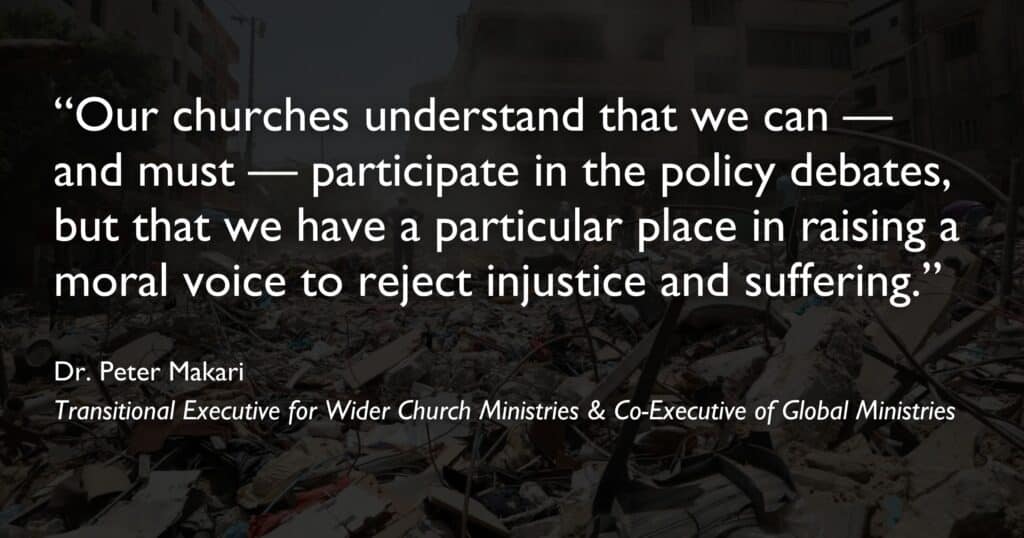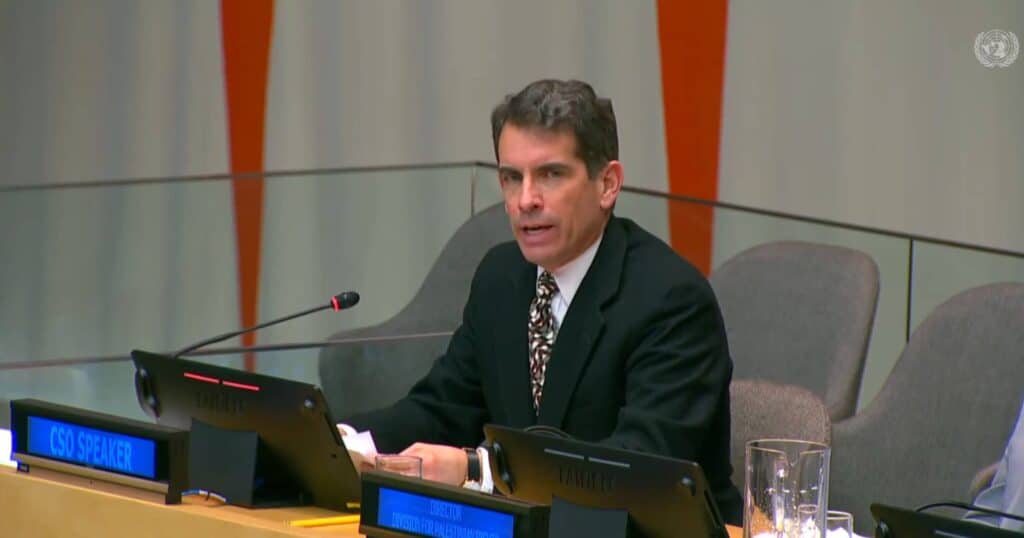At U.N. commemoration, Makari condemns ongoing human rights violations against Palestinians
On a day marked for international solidarity with Palestinian people, the United Church of Christ’s global relations minister for the Middle East and Europe was invited to speak at the United Nations on behalf of civil society.
Peter Makari, who is also currently serving as transitional executive for Wider Church Ministries and co-executive of Global Ministries, condemned ongoing violence and human rights violations against Palestinians, highlighting the efforts of the UCC and the Christian Church (Disciples of Christ) to advocate for justice and peace.
Makari’s speech was part of an annual U.N. program for International Day of Solidarity with the Palestinian People. His invitation from the Committee on the Exercise of the Inalienable Rights of the Palestinian People came before the intensive escalation on Oct. 7 between Hamas and Israel.
“Little did any of us know when these sessions were being planned that we would be in the depths of such a tragic escalation of violence,” Makari said to the committee. “These past several weeks have confirmed once again the willful blindness of the major world powers to the suffering of the Palestinian people, while at the same time providing ample evidence — as if any more is needed — of the absolute necessity, once and for all, to address the core issues at stake to affirm the rights of the Palestinian people to a life with dignity, to live free of occupation, to participate fully and equally in determining their future, and for those scattered as refugees to enjoy the rights accorded to them in international law and U.N. resolutions.
“Only when all of the people of the region are properly respected and humanely treated with their rights, equality and dignity can a peace with justice prevail.”
Cost of lives
Makari told the gathering that the UCC and Disciples “have consistently supported nonviolent means to promote justice, including for almost two decades the use of economic measures such as boycotts, divestment and sanctions,” including the recent Apartheid-Free campaign.
Such efforts are part of the denominations’ longstanding commitment to justice and peace in the Middle East, he said.
“Our churches understand that we can — and must — participate in the policy debates, but that we have a particular place in raising a moral voice to reject injustice and suffering,” Makari said. “We have named the oppression of the Palestinian people as sin and have rejected any theology or ideology, including Christian Zionism, that would privilege or exclude any one nation, race, culture or religion. Tragically, the current escalation has only exacerbated anti-Arab and anti-Muslim attitudes and actions, and anti-Semitism, in the U.S. We must continue to be vigilant in our stand against such hate, which has cost lives.”
Makari noted that, according to the U.N., more than 15,000 Palestinians had been killed in Gaza alone — more than half of them children and women — while tens of thousands more have been wounded in Gaza and the West Bank.
“The UCC and Disciples have already named what is happening now as ethnic cleansing, and our partners in the Middle East, including the Middle East Council of Churches, have called this genocide,” he said.

Solidarity with and by Christians
Makari also highlighted Global Ministries’ partnerships and solidarity with Palestinian Christians.
“As we enter the Christian season of Advent, we are reminded that Palestinian Christians trace their heritage back to the first Christian communities two millennia ago,” he said. “Because of our churches’ decades of engagement with and support for Palestinians, especially through these partnerships, we hear the cries of our Palestinian siblings for an end to the oppression and injustices they face.”
Yet, many governments, including the United States, have been quicker to condemn attacks on Israel than condemning the years of suffering endured by Palestinians, according to Makari.
“When a powerful army occupies and annexes the land of another people, when that population is displaced in massive numbers, when towns and cities are destroyed, when that occupying force commits crimes prohibited by international law and conventions, what does the world do?” he asked. “In the case of the Russian invasion of Ukraine, the world condemned it. But in the case of decades-long Israeli occupation and annexation of Palestinian lands, and massive forced displacement — including more than 1.8 million Palestinians in Gaza these past few weeks — Western powers have blamed the victim. It is an inverted logic.”
He quoted a Palestinian Christian pastor as observing, “This has exceeded our expectations in terms of global silence. Human rights and international law have been discredited.”
Faith communities can help by raising their voices amid that silence.
“Now, perhaps more than ever, is the time for churches, faith groups, and civil society more broadly to double down and offer meaningful solidarity, to stand up for the human and civil rights of a Palestinian people under siege,” Makari said.
75th anniversaries
The International Day of Solidarity with the Palestinian People observance began in 1977, 30 years after the U.N. adopted a resolution on the partition of Palestine.
Makari noted that this year’s commemoration took on a different level of significance, not only because of the conflict that began Oct. 7 but also because this year marks the 75th anniversaries of the Nakba or “catastrophe” – the 1948 displacement and dispossession of hundreds of thousands of Palestinians — and the adoption of the Universal Declaration of Human Rights on Dec. 10, 1948.
The full video of the event can be seen here, with Makari’s introduction and remarks starting around the 1:38:30 mark. A transcript of his full speech can be read here.
Content on ucc.org is copyrighted by the National Setting of the United Church of Christ and may be only shared according to the guidelines outlined here.
Related News
A Prophetic Call for Justice and Peace in Palestine
The executive leaders of the United Church of Christ have issued the following statement...
Read More‘Love is Greater Than Fear’: Regional Youth Events get to the heart of gospel message
United Church of Christ teens attending this summer’s Regional Youth Events (RYE) are...
Read MoreUCC desk calendars available to order now
Prepare for your day, month and year with the United Church of Christ desk calendar —...
Read More


